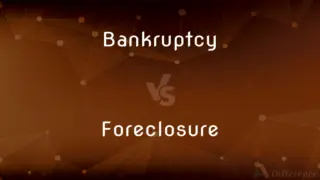Chapter 11 Bankruptcy vs. Chapter 7 Bankruptcy — What's the Difference?
By Tayyaba Rehman & Fiza Rafique — Published on February 15, 2024
Chapter 11 Bankruptcy allows businesses to reorganize debts and stay operational, while Chapter 7 Bankruptcy involves liquidating assets to pay off debts, often leading to business closure.

Difference Between Chapter 11 Bankruptcy and Chapter 7 Bankruptcy
Table of Contents
ADVERTISEMENT
Key Differences
Chapter 11 and Chapter 7 Bankruptcy represent two distinct paths within the United States bankruptcy code designed to handle insolvency differently for individuals and businesses. Chapter 11 Bankruptcy is primarily utilized by corporations, partnerships, and some individuals who wish to retain their business operations while restructuring their debts under the court's supervision. This process allows the debtor to propose a plan for profitability post-bankruptcy, which might include downsizing operations, renegotiating debts, or liquidating assets to pay creditors over time.
Conversely, Chapter 7 Bankruptcy is often referred to as "liquidation bankruptcy." It is the most straightforward and fastest way for an individual or business to discharge debts. In this process, a trustee is appointed to liquidate the debtor's non-exempt assets to pay off creditors. For individuals, this means that they can be relieved of the responsibility to pay their debts from the liquidated assets, while businesses typically cease operations. Chapter 7 is accessible to individuals, partnerships, corporations, and other business entities.
The eligibility criteria for these bankruptcy chapters also differ significantly. Chapter 11 is available to businesses of any size and, under certain conditions, individuals with substantial debts and assets that exceed the limits of Chapter 13 Bankruptcy. Chapter 7, however, has strict means testing to qualify, primarily for individuals, and can be a quicker path to resolving debts for those who have fewer assets and a lower income level.
The outcomes of these bankruptcy filings are markedly different. Chapter 11 aims to rehabilitate the debtor's financial situation and to allow the continuation of operations, potentially leading to a prosperous post-bankruptcy phase. Chapter 7 aims to provide a fresh start by discharging debts but often at the cost of losing non-exempt property and, for businesses, the end of the entity.
Choosing between Chapter 11 and Chapter 7 Bankruptcy depends on the individual's or business's specific financial situation, long-term objectives, and the feasibility of restructuring debts versus liquidating assets to cover liabilities.
ADVERTISEMENT
Comparison Chart
Purpose
Debt reorganization
Liquidation of assets
Typical Users
Businesses, high-debt individuals
Individuals, businesses
Process Duration
Long-term (months to years)
Short-term (3-6 months)
Outcome
Business continues operation
Discharge of debts, possible business closure
Asset Liquidation
Not primary, based on reorganization plan
Mandatory for non-exempt assets
Compare with Definitions
Chapter 11 Bankruptcy
Involves proposing a repayment plan to creditors.
The debtor submitted a reorganization plan as part of their Chapter 11 filing.
Chapter 7 Bankruptcy
Requires a means test for individual eligibility.
The debtor qualified for Chapter 7 after passing the means test.
Chapter 11 Bankruptcy
Accessible to both businesses and individuals.
An individual with extensive debts chose Chapter 11 for its flexibility in reorganization.
Chapter 7 Bankruptcy
Offers a fresh start by discharging debts.
Filing for Chapter 7 allowed the individual to eliminate overwhelming credit card debt.
Chapter 11 Bankruptcy
A reorganization process for businesses.
The company filed for Chapter 11 to renegotiate its debt agreements.
Chapter 7 Bankruptcy
Typically results in the closure of businesses.
The business ceased operations after its Chapter 7 liquidation was complete.
Chapter 11 Bankruptcy
Allows businesses to operate while restructuring.
Under Chapter 11, the business continued its operations without interruption.
Chapter 7 Bankruptcy
Quick process for debt resolution.
The Chapter 7 bankruptcy was concluded within a few months, discharging eligible debts.
Chapter 11 Bankruptcy
Aimed at rehabilitating the debtor's financial situation.
Chapter 11 provided a pathway to financial stability for the struggling corporation.
Chapter 7 Bankruptcy
Involves liquidating assets to pay off debts.
The trustee sold non-exempt assets under Chapter 7 to repay creditors.
Common Curiosities
What is the primary goal of Chapter 7 Bankruptcy?
To liquidate assets and discharge debts for a fresh start.
Who can file for Chapter 11 Bankruptcy?
Businesses and individuals with substantial debts and assets.
Is it possible to keep any property in Chapter 7 Bankruptcy?
Yes, if the property is considered exempt under bankruptcy laws.
Can a business continue operating after filing Chapter 7?
Typically, businesses cease operations under Chapter 7.
Can student loans be discharged in Chapter 7 or 11?
Generally, student loans are not dischargeable, except under special circumstances.
Are tax debts dischargeable in Chapter 7 or Chapter 11?
Some tax debts may be dischargeable, depending on specific conditions.
How long does a Chapter 11 case usually take?
It can vary, often lasting from a few months to several years.
What happens to shareholder stocks in Chapter 11?
Stocks may lose value or become worthless, depending on the reorganization outcome.
Can debts be discharged in Chapter 11?
Yes, some debts may be discharged or restructured.
What's a means test in Chapter 7 Bankruptcy?
A calculation to determine if an individual's income is low enough to qualify for Chapter 7.
What is the difference in costs between filing Chapter 11 and Chapter 7?
Chapter 11 is typically more expensive due to its complexity and duration.
Is Chapter 11 or Chapter 7 better for small businesses?
It depends on the business's goals; Chapter 7 for liquidation, Chapter 11 for reorganization.
Can you switch from Chapter 11 to Chapter 7?
Yes, conversion between chapters is possible under certain conditions.
Can individuals file for Chapter 11?
Yes, particularly those whose debt exceeds Chapter 13 limits.
How does Chapter 7 affect an individual's credit score?
It can significantly lower the credit score and remains on the credit report for 10 years.
Share Your Discovery

Previous Comparison
Bankruptcy vs. Foreclosure
Next Comparison
Horrible vs. HorrificAuthor Spotlight
Written by
Tayyaba RehmanTayyaba Rehman is a distinguished writer, currently serving as a primary contributor to askdifference.com. As a researcher in semantics and etymology, Tayyaba's passion for the complexity of languages and their distinctions has found a perfect home on the platform. Tayyaba delves into the intricacies of language, distinguishing between commonly confused words and phrases, thereby providing clarity for readers worldwide.
Co-written by
Fiza RafiqueFiza Rafique is a skilled content writer at AskDifference.com, where she meticulously refines and enhances written pieces. Drawing from her vast editorial expertise, Fiza ensures clarity, accuracy, and precision in every article. Passionate about language, she continually seeks to elevate the quality of content for readers worldwide.














































